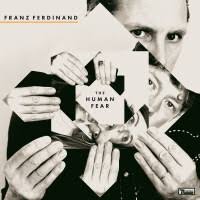Franz Ferdinand have left a lasting mark on the indie rock scene with their sharp riffs and unmistakable energy. Each of their studio albums brings something new to the table, blending innovation with unforgettable hooks. This review takes a closer look at all official Franz Ferdinand albums, from their explosive debut to their most recent evolution.
Popular Questions About Franz Ferdinand
Many people new to the band often ask how Franz Ferdinand got their name. The band took it from Archduke Franz Ferdinand of Austria, whose assassination sparked World War I. They felt the name was both historical and striking, perfect for a band that wanted to make an impact.
Franz Ferdinand formed in Glasgow, Scotland, in 2002. Their roots lie in the city’s vibrant art and music scenes, where they found their distinctive sound.
The band’s lineup has changed over the years. Originally, it included Alex Kapranos, Nick McCarthy, Bob Hardy, and Paul Thomson. Current members include Kapranos, Hardy, Julian Corrie, Dino Bardot, and Audrey Tait.
Franz Ferdinand’s music falls into genres like indie rock, post-punk revival, and dance-punk. Their sound often mixes jagged guitars with tight rhythms and bold vocals.
Their most famous song is “Take Me Out,” which helped launch their international success. It remains a defining track of the 2000s indie rock era.
Among Franz Ferdinand albums, their self-titled debut is the most popular. However, later albums like You Could Have It So Much Better and Tonight: Franz Ferdinand also received widespread praise.
Franz Ferdinand have won several awards, including a Mercury Prize, Brit Awards, MTV awards, and Ivor Novello honors.
Their sound has evolved from raw post-punk to more refined and electronic textures. Each album reflects a different phase in their musical journey.
Themes often explore relationships, identity, fear, and modern life. The upcoming album The Human Fear is expected to expand on these ideas.
Yes, Franz Ferdinand collaborated with the band Sparks to form FFS in 2015. This project blended both bands’ strengths and produced a well-received album.
The Albums
Franz Ferdinand (2004)

Franz Ferdinand’s self-titled debut album arrived in February 2004 and changed the landscape of early 2000s indie rock. From the first track, the band’s sharp riffs and confident rhythm made a lasting impression. The album combined post-punk energy with danceable beats, creating a unique sound that stood apart from its peers.
“Take Me Out” became a breakout hit. It introduced millions to Franz Ferdinand and quickly became one of their most iconic tracks. Other singles like “The Dark of the Matinée” and “Michael” helped solidify the album’s global reach. Every song on the record showcased a blend of wit, urgency, and sonic clarity.
Critics praised the album for its freshness and swagger. It won the Mercury Prize and earned Grammy nominations. It also brought Franz Ferdinand albums into the spotlight internationally. As a result, the band secured commercial success across the UK, US, and beyond.
Commercially, the album went multi-platinum. It topped charts in the UK and reached the top five in many other countries. Although the sound drew comparisons to bands like Gang of Four and Talking Heads, Franz Ferdinand carved out their own voice.
Thematically, the album explores detachment, desire, and nightlife. Yet, it never loses its sense of movement or fun. With razor-sharp lyrics and infectious grooves, it balanced intelligence with style.
Franz Ferdinand albums started strong, and this one remains a cornerstone of their career. It influenced a new wave of guitar bands and expanded the sound of British indie rock. Even after two decades, Franz Ferdinand still feels fresh, energetic, and endlessly listenable. It continues to stand among the best Franz Ferdinand albums ever released.
You Could Have It So Much Better (2005)

Released in October 2005, You Could Have It So Much Better showed that Franz Ferdinand could do more than just repeat their debut’s success. The album retained the band’s sharp energy but introduced a broader emotional and sonic range. With this release, Franz Ferdinand albums proved they could evolve without losing their identity.
The lead single “Do You Want To” delivered instant appeal. It kept their signature groove but added extra swagger. Meanwhile, songs like “Walk Away” and “Eleanor Put Your Boots On” explored slower, more melodic territory. This balance gave the album depth and replay value.
Critics applauded the band’s growth. Many praised their willingness to take risks and expand beyond dance-punk. The record earned strong reviews across major publications. Retrospective opinions still highlight this album as a fan favorite in the Franz Ferdinand discography.
Commercially, the album debuted at number one in the UK and entered the top ten in the US. It achieved platinum status in multiple regions, confirming its global reach. Franz Ferdinand albums had now found a consistent audience worldwide.
Lyrically, themes of heartbreak, disillusionment, and self-awareness run throughout the record. The band moved from pure bravado into more nuanced storytelling. This shift didn’t sacrifice energy—instead, it added emotional contrast.
The album had no major outside collaborators. However, the production by Rich Costey added polish without dulling the band’s edge. The crisp, layered sound marked a step forward in their studio evolution.
You Could Have It So Much Better remains one of the most celebrated Franz Ferdinand albums. It captured the urgency of their debut but matured their sound. As a result, it continues to stand out in their discography for both style and substance.
Tonight: Franz Ferdinand (2009)

Released in January 2009, Tonight: Franz Ferdinand marked a bold shift in direction for the band. While earlier Franz Ferdinand albums leaned heavily on post-punk influences, this one embraced darker tones and electronic textures. The result felt fresh but still recognisably theirs.
“Ulysses,” the lead single, introduced a new kind of swagger. It kept the band’s rhythmic intensity but leaned into synths and grooves. Tracks like “No You Girls” and “Lucid Dreams” further explored danceable beats and layered production. The band drew from dub, electro, and art rock without losing their core identity.
Critics gave mixed but largely positive reviews. Many praised the ambition behind the sound change. Over time, the album gained more respect for its risk-taking. Within the spectrum of Franz Ferdinand albums, this one stands as their most sonically adventurous.
Commercially, the album reached number two in the UK and top ten in several countries. Though it didn’t match the sales of earlier records, it still performed strongly. The singles found consistent radio play, and the band’s live shows continued to draw large crowds.
Lyrically, the album explored themes of nightlife, desire, and disconnection. The concept followed a loose night-out narrative. From anticipation to regret, the songs charted an emotional arc that many fans found relatable.
The band collaborated again with producer Dan Carey, who helped them sculpt a more electronic sound. His influence is audible in the use of drum machines, loops, and atmospheric effects. These production choices gave the record its distinctive character.
Among all Franz Ferdinand albums, Tonight represents a pivotal turning point. It proved they weren’t afraid to evolve and experiment. Though different from their earlier work, it remains an essential part of their discography for its ambition and creativity.
Right Thoughts, Right Words, Right Action (2013)

Released in August 2013, Right Thoughts, Right Words, Right Action saw Franz Ferdinand return with confidence and clarity. After the experimental tones of their previous record, this album felt like a reset. It combined the raw energy of early Franz Ferdinand albums with the polish of seasoned performers.
The title track opened the album with sharp riffs and swagger. “Love Illumination” and “Right Action” quickly became fan favorites, showing the band still knew how to deliver catchy hooks. Although the songs leaned into fun, they never felt shallow or formulaic.
Critics welcomed the return to form. Many praised the record for balancing immediacy with smart lyrics and sharp arrangements. It didn’t try to reinvent the wheel. Instead, it reminded listeners why they loved Franz Ferdinand albums in the first place.
Commercially, the album reached the top ten in the UK and performed well across Europe and parts of Asia. It may not have matched earlier chart highs, but it confirmed the band’s enduring appeal. The singles earned solid airplay and helped boost tour attendance worldwide.
Lyrically, themes of communication, relationships, and irony featured throughout. The tone remained playful, yet there was more reflection beneath the surface. That blend kept the songs engaging on repeated listens.
This record included collaborations with a few guest musicians but stayed focused on the core band dynamic. Producer Alex Kapranos helped shape the overall sound, maintaining consistency and drive across all ten tracks.
Among Franz Ferdinand albums, Right Thoughts, Right Words, Right Action stands out as a confident, punchy release. It brought the band back into focus after a four-year gap. With its sharp songwriting and direct approach, the album reaffirmed their place in modern rock.
Always Ascending (2018)

Released in February 2018, Always Ascending marked a new chapter in the evolution of Franz Ferdinand. With the departure of guitarist Nick McCarthy and the addition of new members, the band reshaped its sound. Unlike earlier Franz Ferdinand albums, this one embraced a glossy, synth-heavy aesthetic while keeping their rhythmic backbone intact.
The title track set the tone, blending disco, art rock, and electronic elements. It announced a fresh sonic direction without abandoning the band’s core appeal. Songs like “Lazy Boy” and “Feel the Love Go” showed how Franz Ferdinand could still write bold, danceable tracks.
Critics responded with cautious optimism. Many welcomed the sonic risks, even if the reception wasn’t universally enthusiastic. However, in retrospect, Always Ascending is often praised for its ambition and shift in tone. It holds a distinct spot among Franz Ferdinand albums for its reinvention and maturity.
Commercially, the album landed in the UK top ten and charted across Europe. It didn’t match the impact of earlier releases but maintained strong fan engagement. The band’s expanded lineup brought new energy to their live shows, with setlists blending old and new material seamlessly.
Lyrically, the record explored modern life, uncertainty, and emotional distance. The tone often felt detached but intentional, matching the shimmering, polished production. These themes added depth behind the dancefloor-ready surface.
Produced by Philippe Zdar of Cassius, the album leaned heavily into synths, loops, and clean arrangements. His influence shaped the modern, slick sound that defined the record. That collaboration helped differentiate this release from previous Franz Ferdinand albums.
Ultimately, Always Ascending showcased a band unafraid to move forward. It proved they could experiment without losing their identity. This album stands as a clear example of how Franz Ferdinand continues to evolve while staying true to their roots.
The Human Fear (2025)

Released in May 2025, The Human Fear is the most thematically ambitious of all Franz Ferdinand albums. This record confronts anxiety, isolation, and resilience in the modern age. It builds on the band’s legacy while introducing bold ideas and deeper emotional weight.
The lead single “Silent Reaction” set the tone—urgent, moody, and lyrically sharp. The album’s sound blends post-punk rhythms with darker synth textures and atmospheric layering. Though the record ventures into new territory, it still pulses with the energy that defines Franz Ferdinand albums.
Critics applauded the album’s maturity and purpose. Many considered it their most cohesive release since their debut. The emotional gravity, paired with sleek production, earned praise for showing the band’s growth. This balance between message and sound brought new depth to their discography.
Commercially, The Human Fear debuted in the UK Top 5 and performed well internationally. Although not built around instant hits, the album connected strongly with listeners. Its themes struck a chord during a time of global uncertainty, and that relevance helped sustain its success.
Lyrically, the record dives into fear of change, digital fatigue, and the longing for connection. These themes create a narrative arc across the album. Each song reveals a different angle of emotional vulnerability, giving the record a unified, reflective tone.
Franz Ferdinand collaborated with producers known for cinematic and ambient styles. These influences appear in the album’s rich textures and dynamic pacing. Guest musicians contributed subtle layers, though the core band remained central throughout the process.
Within the scope of Franz Ferdinand albums, The Human Fear stands out as their most introspective and resonant work. It proves that, even two decades into their career, Franz Ferdinand can challenge themselves and their listeners with brave, relevant music.
Overall, Franz Ferdinand albums blend sharp songwriting with evolving sounds that keep listeners engaged. Each record delivers fresh energy and proves the band’s enduring creativity.

